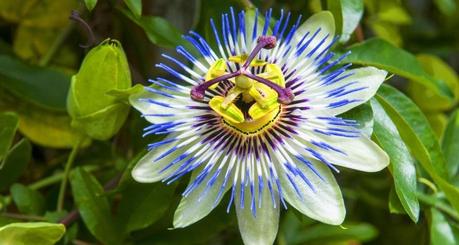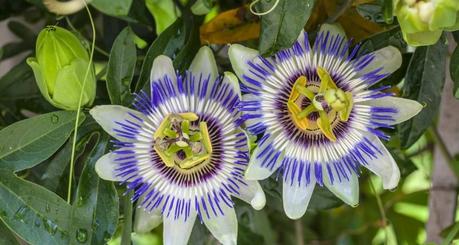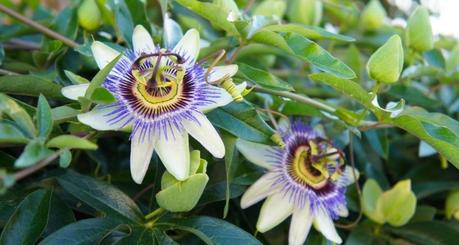Scientific Name(s): Passiflora incarnata L. Passiflora incarnata, Apricot Vine, Burucuya, Corona de Cristo, Fleischfarbige, Fleur de la Passion, Fleur de Passiflore, Flor de Passion, Granadilla, Grenadille, Herba Passiflorae, Jamaican Honeysuckle, Jamaican Honeysuckle, Madre Selva, Maracuja, Maracuva, Maypop, Maypop Passion Flower, Pasiflora, Pasionari, Pasionaria, Passiflora, Passiflorae Herba, Passiflore, Passiflore Aubépine, Passiflore Officinale, Passiflore Purpurine, Passiflore Rouge, Passiflorina, Passion Flower Herb, Passion Fruit, Passion Vine, Passionaria, Passionblume, Passionflower, Passionflower Herb, Passionsblomma, Passionsblumenkraut, Purple Passion Flower, Purple Passionflower, Water Lemon, Wild Passion Flower and Wild Passion Flower (P. incarnatus)
WHAT IS PASSION FLOWER:
Passion flower is a climbing vine with purple and white flowers. The scientific name of passion flower is Passiflora incarnata L. The chemicals present in the passion flower have some calming effects.
This magical herb is native to the southeastern United States and Central and South America.
WHAT IS PASSION FLOWER USED FOR?

Passion flower is used in the following problems:
- In insomnia
- To reduce anxiety
- In the treatment of attention deficit hyperactivity disorder
- To relieve discomfort before surgery
- Passion flower can be applied directly on the skin. If there is a wound, scratch , swelling or irritation on the skin, then applying passion flower is beneficial.
- In food and beverages, this flower and its extract are added for flavor, smell and aroma.
HOW DOES PASSION FLOWER WORK?
There is not much research available yet on how it is an herbal supplement and how it works. For more information about this, you should contact a herbal specialist or a doctor. However, some research suggests that the chemicals present in the passion flower have calming effect and relieving muscle spasms.
PRECAUTIONS AND WARNINGS:

Consult a doctor or herbalist before using it in the following circumstances:
- If you are pregnant or breast-feeding. In both the cases the medicine should be taken only on the advice of the doctor.
- If you are taking other medicines. This includes both prescription and non-prescription medicines, which are available in the market for purchase without a prescription.
- If you are allergic to any substance in passion flower or any other medicine or drug.
- If you have any disease, disorder or any other medical condition.
- If you have any other allergies to food, dyes, preservatives or animals.
For more information, consult your herbalist or doctor.
HOW SAFE IS PASSION FLOWER?
Passion flower is generally safe, if ingested in moderate amounts in food. It is safe for almost everyone to drink passion flower tea before sleeping at night for seven days. It is safe to take its medicine in prescribed quantity for 8 consecutive days. If the extract of this flower is eaten in high quantity, such as more than 3.5 grams continuously for two days, then it can cause side-effects.
SPECIAL PRECAUTIONS AND WARNINGS:

Children:
Medicines made of passion flower extract are normally safe for all children to take in the prescribed dose and for short duration of time. A specific passion flower product has been used safely in children aged 6-13 years for up to 8 weeks.
Pregnancy and Breast-Feeding:
It is not safe to use passion flower as a food or medicine during pregnancy. The chemicals present in it can cause the uterus to shrink. Therefore, if you are pregnant, do not use it. There is no research on whether passion flower is safe for pregnant women, be safe and avoid using it.
SIDE EFFECTS:
Passion flower may cause the following side-effects:
- Sleeping too much
- Dizziness
- Be unnecessarily confused
However, it is not necessary for everyone to have these side-effects. There may be some side-effects that are not mentioned above. If you experience any of these side-effects or want to know more about them, contact your nearest doctor.
INTERACTIONS:
Sedative and Passion Fruit:
The elements present in passion fruit can cause excessive sleepiness in the body. Sedatives also have the same effect on the body. Therefore, taking sedative and passion fruit together may lead to excessive sleepiness. It is not advisable to use these two together.
Sedatives that cannot be taken with passion fruit include:
- Pentobarbital (Nembutal)
- Phenobarbital (Luminal)
- Sekabarbital (Gross)
- Zolpidem (Ambien)
- Clonazepam (Klonopin)
- Lorazepam (Ativan)
WHAT IS THE USUAL DOSAGE OF PASSION FLOWER?
Worry:
In the treatment of anxiety, one capsule containing 400 mg extract of passion flower should be taken twice a day for 2 to 8 weeks. You will feel the difference by taking 45 drops of the medicine containing the extract of this flower every day for a month.
Anxiety Before Surgery:
One day before the scheduled day of surgery, 20 drops can be taken. In addition, 20 drops can be taken 90 minutes before the surgery. A tablet containing 500 mg passion flower extract is also given to the patient 90 minutes before the surgery.
A medicine containing 260 or 1000 mg of its extract is given 30 minutes before a dental surgery.
The dosage of this herbal supplement may vary from person to person. The dosage you take depends on your age, health and many other factors. Herbal supplements are not always safe. Therefore, discuss with the herbalist or doctor for the correct dosage information.
IN WHAT FORMS DOES THE PASSION FLOWER COME?
Passion flower may be available in the following forms:
RELATED ARTICLES:
- St. John's Wort : Side Effects, Uses, Dosage, Interaction and Precautions
- 8 Best Home Remedies to Treat Depression and Anxiety
- Anxiety: Symptoms, Causes, Diagnosis, Prevention, Treatments and Home Remedies
- Antidepressants : Working, Side-Effects, Uses and Effectiveness
- Delusional Disorder (Delusions): Causes, Symptoms, Diagnosis and Treatments
- Schizophrenia: Symptoms, Causes, Prevention and Treatments

